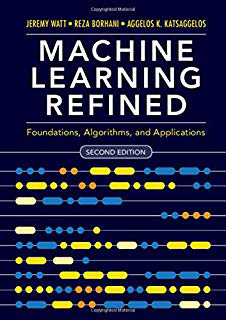New Textbook Offers Refined Treatment of Machine Learning
The second edition of Machine Learning Refined aims to meet the growing demand for educational resources on machine learning fundamentals
Machine learning is the study of algorithms that use data to find rules and patterns in our everyday lives — from physical and biological systems to social and financial ones. Once a subject studied by a small number of academic circles, today machine learning is increasingly popular and is the backbone of technology used by researchers from all academic disciplines, as well as members of industry, data scientists, and entrepreneurs.
 Machine Learning Refined (Cambridge University Press, 2020), a second edition textbook co-authored by Northwestern Engineering’s Jeremy Watt, Reza Borhani, and Aggelos K. Katsaggelos, provides readers with the fundamental knowledge and practical tools needed to conduct research in this growing field. The earlier edition has been used for a variety of senior-level undergraduate and graduate courses in machine learning, deep learning, mathematical optimization, and reinforcement learning. The second edition will be used for the same courses.
Machine Learning Refined (Cambridge University Press, 2020), a second edition textbook co-authored by Northwestern Engineering’s Jeremy Watt, Reza Borhani, and Aggelos K. Katsaggelos, provides readers with the fundamental knowledge and practical tools needed to conduct research in this growing field. The earlier edition has been used for a variety of senior-level undergraduate and graduate courses in machine learning, deep learning, mathematical optimization, and reinforcement learning. The second edition will be used for the same courses.
The book’s narrative approach emphasizes application, geometric intuition, and algorithmic thinking. “This approach, in our experience, helps remove the veil of unnecessary complexity that too often surrounds the subject, and equips the first-time learner with the tools and confidence they need to study more advanced topics or even do work in the field,” said Watt, adjunct assistant professor of electrical and computer engineering.
This second edition emphasizes practical applications, with examples from disciplines including computer vision, natural language processing, economics, neuroscience, recommender systems, physics, and biology. “We have also included over 300 color illustrations that have been meticulously designed to enable an intuitive grasp of technical concepts,” said Borhani, adjunct assistant professor of electrical and computer engineering.
Another unique feature of the new textbook is the emphasis on the importance of mathematical optimization in its treatment of machine learning.
“Optimization is the workhorse of machine learning, and a strong understanding of it is requisite if one wishes to deeply understand machine learning, and if one wishes to be able to implement its fundamental algorithms,” said Katsaggelos, Joseph Cummings Professor of Electrical and Computer Engineering. “Through over 100 Python programming exercises, readers will gain significant hands-on experience coding up machine learning algorithms from scratch.”
Interested readers can get a taste of the textbook’s unique offerings, including interactive animations and illustrations of core machine learning concepts, on the book’s official GitHub repository.
